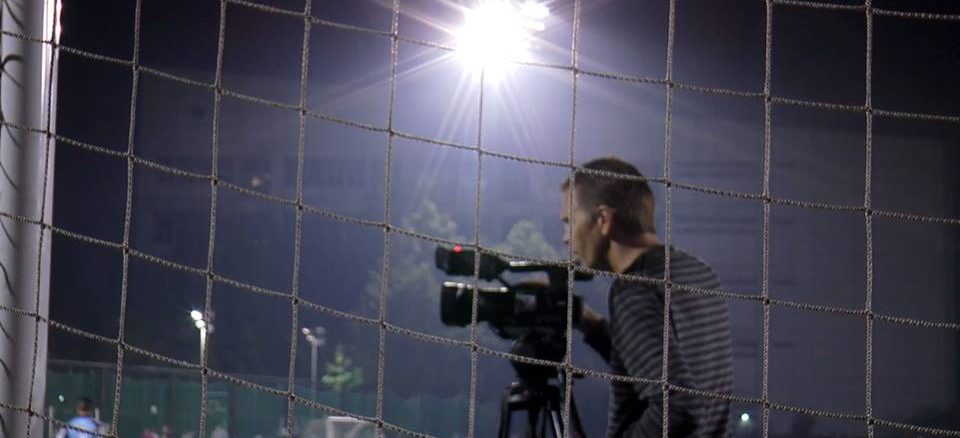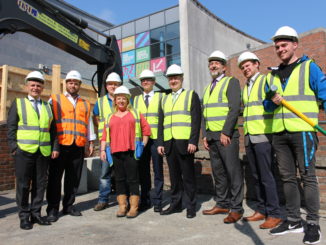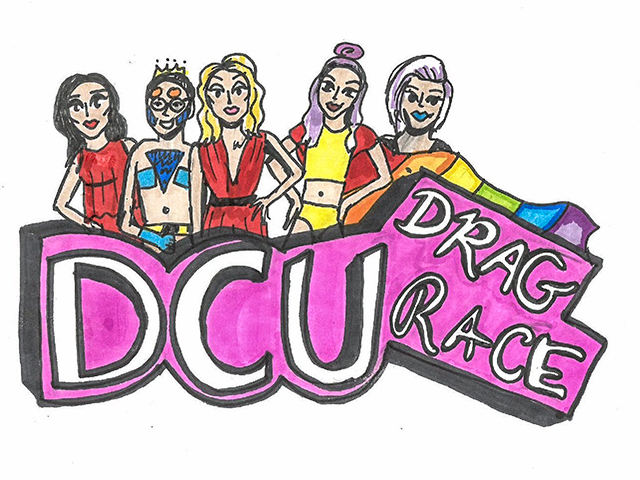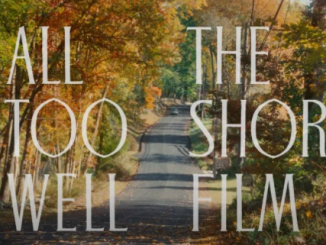
Sport is a competitive battle of endurance and desire for victory. Individual battles add up to make a war, and a war curtails an underlying conflict of political, economic or religious tension. Sport combines athleticism with finesse, and masculine repression with delicate restraint. Whereas war divides where sport supposedly unites.
The reporting of sport by the media and those involved in it exhibit similar internal conflicts, albeit with less reward and more oppression than the medals and silverware procure. Discrimination is often discussed in terms of those in media reporting on sporting events and its athletes, but very rarely is discrimination ever found among fellow journalists, sometimes countrymen of the same nation – based on a sport. Based on religion.
Jerome Quinn is a freelance video journalist working for various social media outlets and websites. He is the dominant figure in visual Higher Education Gaelic football and camogie coverage online through highlights packages, interviews with managers and players and other features.
Having previously worked at the BBC presenting Gaelic football, he recalls memories discovered in a revolution of sporting coverage in the Beeb in Northern Ireland, at a time when Gaelic games had only then reached the beginning of mainstream coverage in the North at the beginning of the 1990s.
However within this internal rebellion between him and his own colleagues based on divides as trivial and equally significant as sport and religion, Jerome came to recognise those schisms spread into sports coverage, between Gaelic games and other sports, and among the socio-political and religious identities of those who advocated each.
“I went for a job in BBC Northern Ireland sport in 1989,” he explains. “They didn’t give it to me but gave it to a guy from Bangor. The job was to look after their Gaelic coverage and they gave it to this guy who had no Gaelic background, was working at a newspaper and had no broadcasting qualifications.
“I had a diploma in journalism and was steeped in a GAA background. I had proven that I knew all about GAA and they gave it to this other guy.” He explains that the man was Protestant.
Jerome was born in Omagh and raised as a Catholic. He realised an internal desire for reporting from an early age. Graduating at 22 from Cardiff University, he completed three years of university in Sunderland before receiving his postgraduate degree in journalism.
“I remember going to my careers officer. I didn’t really know what I was doing in those days. He asked me what I wanted to do when I grew up, and I told him I wanted to be a journalist.
“He turned to me and said, ‘you don’t want to do that. It’s too hard to get into, you want to do sciences. Everybody is doing science these days.’
“He made me do two additional years of chemistry and physics and maths. I failed them all and it was the most miserable two years of my life.”
Ten years later, working for the BBC, Jerome was asked to give a talk at his old school. As a journalist.
Working for Radio Foyle in Derry soon after graduating, he would commit an unusual career backtrack for a reporter by earning his keep on radio before moving into print for the Irish News as a GAA reporter. But the next step up the ladder was prevented when his application in the BBC was rejected.
“In those days the head of sport in BBC was a person who didn’t employ Catholics, basically. In fact they left a few months later, I applied for the job again and I got it. There was a new guy in as head of sport and I was the first Catholic to be employed by BBC Northern Ireland Sport in any sort of production capacity.
“But that’s why I didn’t get into it first and I went into newspapers. You can only deduce from that that it was discriminatory behaviour. But that’s the way the place was in those days. You couldn’t get up the system because of that.”
With his feet now in the door on the sports team, new head of sport at BBC Northern Ireland Jim Neilly went about incorporating Gaelic games.
“He changed everything,” says Quinn. “All of a sudden he said that we were going to do Gaelic and brought in the first ever championship television programme and we started to do Gaelic coverage in May 1990.
“We took the Ulster Championship and every Sunday night we had an hour long Match of the Day style programme. Everybody was absolutely astonished that we were doing this programme. We had floods of letters coming in. Gerry Adams wrote in congratulating the programme and you can imagine the reaction that got. It was a complete turnaround from no coverage of Gaelic to lots of coverage.”
But the revolution was always self-contained, he goes on to say, due to the fact that many colleagues were not on board with coverage of Gaelic games at the time.
“I was an assistant radio producer and I was discriminated against. Certain people didn’t want to know anything about Gaelic, they just wanted me to do the Gaelic programme and stay out of their way.
“I went to games doing soccer and Gaelic. But when you went to soccer games people would be very suspicious of you. You would go to the likes of Windsor Park and you would see them looking at you, because they were looking at you thinking, ‘that’s the guy who does the Gaelic’.”
Jerome recalls an incident involving a fellow reporter attending football games.
“I remember a colleague of mine was in a press box at Linfield and the people in the crowd just turned on him. They were banging on the windows and screaming abuse at him. That sort of thing happened back then and still sort of happens to an extent.
“You had it from people you worked with, from your boss. It was at different levels and degrees but it was because of the underlying politics of religion in Gaelic. It just wasn’t the way things had been done.”
Having left the BBC a number of years ago on the grounds of accusations labelled against him of criticising the company of being discriminatory, he now resides happily covering Higher Education Gaelic football and hurling, as well as ladies’ football and camogie as a freelance video journalist, most recently returning home to Belfast having documented the Ladies All-Star Team’s successful trip to San Diego, CA.
“It doesn’t matter if you’re reporting on All-Ireland Final day in September or if you’re reporting from a preliminary round of the Sigerson Cup in January,” he adds.
“A lot of people from other sports don’t get that. I am motivated the same way for Higher Education games, Ulster colleges games, camogie games, ladies’ football, as I would be for the All-Ireland finals.”
The BBC experience dabbled in mixing revolution with revolt, all in the name of sport. But was it worth the struggle?
“On the one hand it was great and exciting and it was out there. Gaelic was a sport and you were getting recognition for it. You were always thinking that there are a lot of people here who don’t want this and were dragging you down. So there was an undercurrent of people who didn’t want to see the changes.
“There was an edge to it.”
Aaron Gallagher
Image credit: Jerome Quinn Media




Leave a Reply